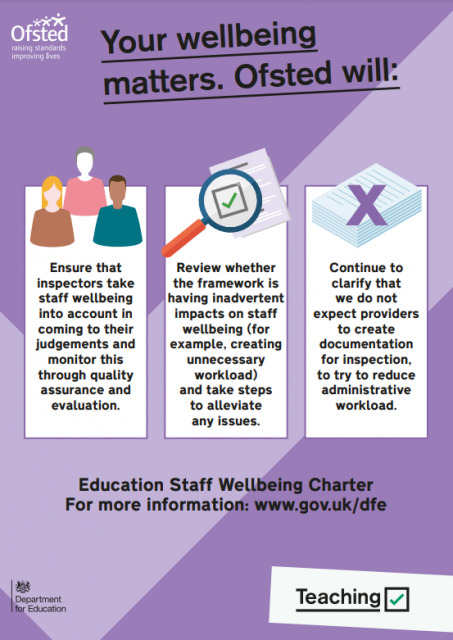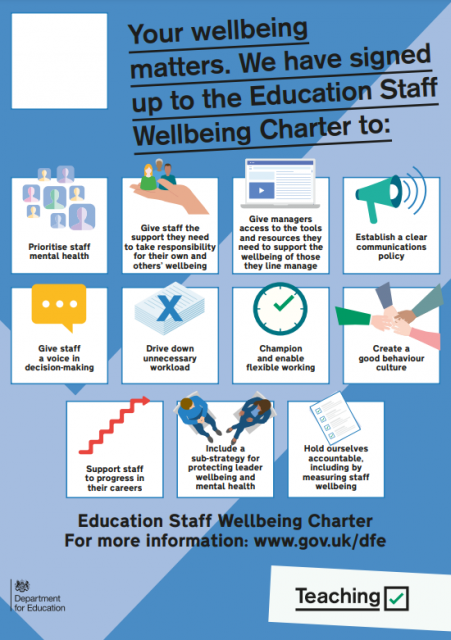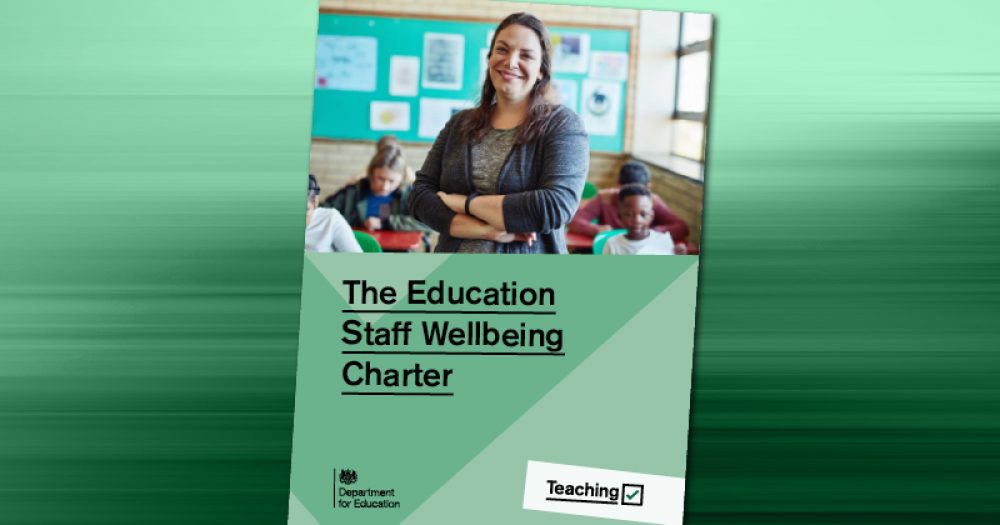Ofsted will review the impact its inspection framework has on staff wellbeing and the government has promised not to publish guidance outside of working hours as part of a new charter unveiled today.
The Department for Education and Ofsted have made 12 commitments as part of the new education staff wellbeing charter.
From the autumn, schools and colleges will also be able to sign up to a voluntary charter of 11 pledges, aimed at showing a commitment to “protect, promote and enhance” staff wellbeing.
One of Ofsted’s three commitments is to “review whether the framework is having inadvertent impacts on staff wellbeing (for example, creating unnecessary workload) and take steps to alleviate any issues”.

They will also ensure inspectors take staff wellbeing into account in coming to their judgements and monitor it through quality assurance and evaluation.
One of DfE’s nine pledges is to publish gov.uk updates aimed at education professionals “only during working hours”. However, exceptions include if there is a “significant user need” in publishing the information, or a legislative requirement
End of mental health stigma
The DfE also wants to break down stigma around mental health by building it into its “wider communications strategy on recruitment and retention, linking to existing campaigns that aim to tackle mental health stigma in our society”.
Schools and colleges who sign the charter commit to “placing wellbeing and mental health at the heart of our decision making.
“We will support staff to make positive choices for their own wellbeing and encourage a collegiate culture across and between all roles in the school or college,” it reads.
Pledges include having a “sub-strategy” for protecting school and college leader wellbeing and mental health, as well as “hold[ing] ourselves accountable” by “measuring staff wellbeing” and monitoring “rends over time”.

A charter schools and colleges can sign up to from the Autumn
The government will review the progress its made against the commitments in 2023. Schools and colleges will also be surveyed to gauge how much impact the charter has had.
The charter was drawn up by a group made up of teaching unions, several schools and colleges and mental health charity Mind.









This is good to hear as I still get wind of far too many instances of providers being asked to produce information in a way that suits inspectors rather than it being in its ‘natural state’ in the provider as it were. The worst examples involve lead inspectors asking providers to print everything out for them to look at. And, of course, most providers, being eager to please, are only too happy to oblige.
Yes Richard, I know of a college that got their inspection delayed because of the demands made by a lead inspector of how he wanted their data presented. It is not the job of any learning and skills provider to do loads of work on presenting data, unless it will help them to demonstrate something that impacts either positively or negatively on the impact of the quality of education. Similarly, if inspectors cannot get their job done in normal working hours they should not expect premises to be kept open or staff to stay on to meet their every need. Good leads will quickly understand what you do and fit the inspection activities to your delivery patterns. If not, nominees should put their concerns in writing to the lead. Inspection should be done with you, not to you.
So, ofsted will “ensure inspectors take staff wellbeing into account in coming to their judgements”? We know they’re out of touch with teaching themselves but are they so out of touch with teachers that they do not realise that they are the problem, not the solution? Other than soundbites and sketchy ‘research’, what have they done since March 20? Would anyone miss Ofsted? I’d much rather have feedback from a trusted peer, a fellow teacher rather than someone who may have led a department or a school 20 years ago. Ofsted are simply not in a position to judge and have no credibility.
Another document that constantly refers to ‘schools and colleges’
What about all the other Education/FE Providers?????
I would agree with the last comment, what about adult providers or does this come under the further education bracket?
I would like to see Ofsted making the Education Staff Wellbeing Charter part of their inspection recommendations, i.e. have you signed up to this charter? If not, why not? If you have, how is it progressing? which pledges are you working on? etc.